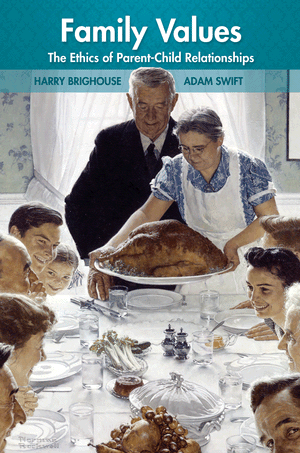
Its been a long time coming, but we, at least, feel it’s been worth the wait. My book with Adam Swift, Family Values: The Ethics of Parent-Child Relationships , was published earlier this Fall. The book originated in conversations we started having many years ago when I was living in the UK, and we found not only that we were both planning to write books about the place of the family in liberal egalitarian theory, but had similar enough views, and different enough habits of mind, that a book written together would be better than either of us would write separately. Here’s the publisher’s blurb:
, was published earlier this Fall. The book originated in conversations we started having many years ago when I was living in the UK, and we found not only that we were both planning to write books about the place of the family in liberal egalitarian theory, but had similar enough views, and different enough habits of mind, that a book written together would be better than either of us would write separately. Here’s the publisher’s blurb:
The family is hotly contested ideological terrain. Some defend the traditional two-parent heterosexual family while others welcome its demise. Opinions vary about how much control parents should have over their children’s upbringing. Family Values provides a major new theoretical account of the morality and politics of the family, telling us why the family is valuable, who has the right to parent, and what rights parents should—and should not—have over their children.
Harry Brighouse and Adam Swift argue that parent-child relationships produce the “familial relationship goods” that people need to flourish. Children’s healthy development depends on intimate relationships with authoritative adults, while the distinctive joys and challenges of parenting are part of a fulfilling life for adults. Yet the relationships that make these goods possible have little to do with biology, and do not require the extensive rights that parents currently enjoy. Challenging some of our most commonly held beliefs about the family, Brighouse and Swift explain why a child’s interest in autonomy severely limits parents’ right to shape their children’s values, and why parents have no fundamental right to confer wealth or advantage on their children.
Family Values reaffirms the vital importance of the family as a social institution while challenging its role in the reproduction of social inequality and carefully balancing the interests of parents and children.
You can read more about it, too, at the p. 99 test.
A good number of the ideas have been tested at some point or another on Crooked Timber, and we’re grateful to commentators for taking us to task. In fact we’ve been lucky in having been able to publish, and get feedback on, some of our ideas along the way – among the many reasons it’s taken us a while is that our ideas have evolved in response to the feedback we have gotten (this is my way of saying that the book is not a simple repackaging of the best-known papers we’ve published on the subject, but a wholesale rethinking with substantially different arguments and, in some cases, conclusions).
Since the book is about the family, I thought I’d share two of my children’s reactions when I first brought a copy of the book home. My 8 year old (boy) said “Oh you wrote a book, that’s interesting. Its a bit strange having that huge dead chicken on the cover, though”. The eldest (girl, whose friends were still frequenting the house in great numbers when the first copy turned up, just before she left for college) was less excited. “My friends are really impressed that you’ve written a book. But I’m not really. I mean, it’s just part of your job, isn’t it? It’s just what you’re supposed to do. I mean….its not like you taught a third grader to read, or something like that“.
